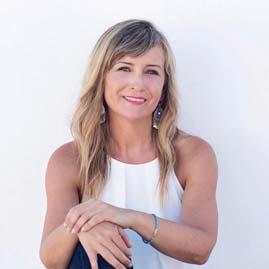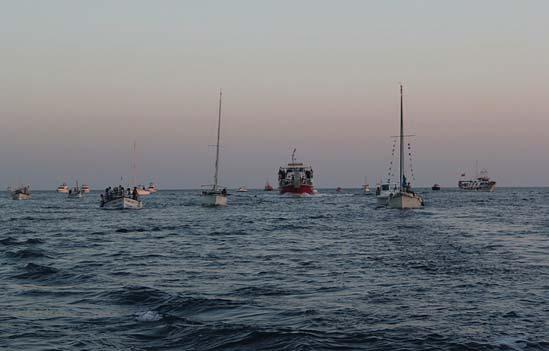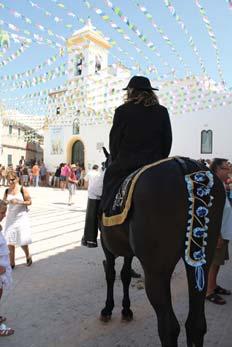
7 minute read
SUMMER CELEBRATIONS:
LOCAL TRADITIONAL FIESTAS IN JULY
THERE IS ALWAYS AN OCCASION TO CELEBRATE IN MENORCA
One of the quintessential aspects of Spanish culture is that every week of the year in various places around the country, different towns are celebrating their local fiestas.
There is always a reason to celebrate, and isn’t that what life is all about? Spanish know how to party and they always make it a priority. That is my kinda life philosophy!
During the summer months, Menorca continues to unsettle the typical tranquility of the island with its own traditional fiestas, filling up the summer calendar with festive spirit. Even after all these years the fiestas are still one of my most favourite aspects of island life.
Menorcans are Masters of Ceremonies and Celebration. Almost all of the fiestas centre around a Patron Saint and seamlessly fuse together a religious ceremony with tradition and street parties to create some of the most memorable events you will ever experience.
As a professional special event manager, I’m always fascinated at how these fiestas appear to run on automatic with a life of their own.
by Vanessa

Everyone seems to be born knowing what they are doing without an event coordinator or production schedule in sight. It’s a credit to the councils, stakeholders and townspeople for making it happen each year so magically. Traditions are passed down through generations, and months of preparation go into it. There is a time and season for each task leading up to the event. It has been that way for as long as anyone can remember, and everyone plays their part with precision.
MENORCA’S FIESTA TRADITIONS
Following the grand opening of the fiesta season with Sant Joan in Ciutadella at the end of June, there are a couple of (much needed) weeks to recover as the preparations are finalised in the other towns around the island.
Each town has a different patron saint and their own version of what can be affectionately summarised as ‘Horses & Jaleo’. Celebrations continue through the whole of summer during July, August and September.

Some of towns have fixed dates as the fiestas are held on the same day every year regardless of the day of the week. In other towns, the fiestas are on fixed weekends of the month, meaning that the dates shift slightly each year.
The theme of each fiesta is the same, true to what has come to be known as the traditional Menorcan Fiestas of this island. The aforementioned Horses and ‘Jaleo’, celebrate the Equestrian tradition on the island. The incredibly beautiful and skilled Menorcan Breed of Horses, honouring the farming families, and the local bands are the protagonists. Each town has their own official protocols and schedule of events, but all include the main traditions, albeit on a smaller scale than Ciutadella.
HERE ARE THE PROTOCOLS THAT ARE CONSISTENT IN ALL THE FIESTAS OF THE ISLAND:
‘Primer toc des Fabiol’: The first tap of the drum and sound of the flute marks the official start of the fiesta. The person who plays the flute and drum throughout the whole fiesta is known as the ‘Fabioler’, usually someone with experience in the job, a healthy set of lungs, rhythm and stamina, and often a town official. Resembling what we know in English to be ‘The Pied Piper’, this person asks for permission from the head horserider of the cavalcade to start the fiesta and then plays the first sounds of the drum and flute. The Fabioler then rides through the town whilst playing the fiesta tune to collect the other riders who form the cavalcade of horses.
‘El Jaleo’: Once the whole cavalcade is assembled and complete in order, the cavalcade makes its way to the central square of the town, where the local band will play the fiesta tune known as the ‘Jaleo’ as the horses lap the central square in order, occasionally rising on their hind legs whilst the crowds shout ‘¡Olé!’. A spectacular display of the equestrian abilities of these well-trained and experienced horses and their accomplished riders.
‘Sa Missa’: I have paraphrased here as each town has a different name to refer to the religious ceremony held in the church in honour of the Patron Saint and the town fiesta. Missa means Mass, each town celebrates theirs at a different time and with a different name, this is usually reserved for official participants or local townspeople depending on the size of the church.
‘Sa Convidada/ Recepció’: There is usually at least one official lunch or supper for the riders with the local council or religious leaders. This is a closed event for official participants.
‘Darrer toc des Fabiol’: The fiestas officially close the same way as they open, with the final tap and flute of the ‘Fabioler’. ‘Fins l’any qui ve, si deu vol.’ meaning ‘Until next year if god wishes’ - the traditional phrase said by many to close each fiesta.
Additional Aspects
Carnival Rides & Stalls: Most of the towns have carnival rides and stalls open during the days of the fiesta depending on the space available at each location. Check specifically for each town and the corresponding dates. Always great fun for the kids in the morning or early evening.
‘Els Gegants i Capgrossos’: Several of the towns create what translates to ‘Giants and Big Heads’ which are usually big puppets and costumes with oversized heads that participate in the official order of events. Also good fun for families with small children.
Each town also has their own unique touches to make the fiesta their own, and the streets are always filled with the townspeople celebrating together as friends and family.
‘LA FIESTA DEL VIRGEN DEL CARMEN’ - CELEBRATING THE PATRON SAINT OF THE SEAS
In addition to the traditional local town fiestas with horses, July also sees the celebration of the Feast Day of the ‘Virgen del Carmen’, the patron of the sea and fishermen.

The official Feast Day is on the 16th of July this year which is a Sunday but celebrations are also taking place on the Saturday.
In the Ports of Ciutadella, Fornells and Mahón, there is a Maritime Procession of Boats to pay homage to the Patron Saint. The largest procession is in Mahon including boats from the Navy, Fishing Boats, Recreation Boats and Sporting Boats. This year the procession is being held on the evening of 15th July between 19:00 and 21:00. Quite the sight to take photos if you are there to see them sail out to the entrance of the port to as the sun sets. The Banda de Música de Maó will also be playing in the Port of Mahon at 20:00 followed by a Menorquin group with guitars singing local and seafaring songs at 21:00.
Schedule Of Events For July
So the good news is that you are likely to be able to catch a local celebration in July as this month they are spread out in different parts of the island.
Here are the events in date order, check out the Event Guide at the back of the magazine for more details, or visit my website menorcablue.com where you will find an article on each celebration with a more complete schedule on the traditions and timings of each fiesta. Times are orientative so you know approximately between what times activities take place.
Es Mercadal: Sant Martí - 15 & 16 July 2023
Feast of Saint Martin, Patron of Es Mercadal. Annually on the third weekend in July.
Saturday 15th - Primer Toc 5.00pm & Jaleo 7.00pm
Sunday 16th - Primer Toc 9.00am & Jaleo 11.00am
Ports de Maó, Fornells i Ciutadella: Festes de la Verge de Carme - 15 & 16 July 2023
Feast of the Virgen Carmen, Patron Saint of the Sea. Procession of Boats in the evening.

Port of Mahon: 15th July 19:00 – 21:00.
Fornells: Sant Antoni - 22 & 23 July 2023
Feast of Saint Anthony, Patron of Fornells. Annually on the fourth weekend in July.
Saturday 22nd - Primer Toc 5.00pm & Jaleo 8.30pm
Sunday 23rd - Primer Toc 9.00am & Jaleo 12.00pm (approx. after Mass)
Es Castell: Sant Jaume - 24, 25 & 26 July 2023
Feast of Saint James, Patron of Es Castell.
Monday 24th - Primer Toc 10.00am & Jaleo 8.00pm
Tuesday 25th- Primer Toc 7.45am & Jaleo 1.00pm (approx. after Mass)
Es Migjorn Gran: Sant Cristòfol - 29 & 30 July 2023
Feast of Saint Christopher, Patron of Es Migjorn Gran.
Saturday 29th - Primer Toc 6.00pm & Jaleo 9.00pm
Tuesday 30th- Primer Toc 9.00am & Jaleo 12.00pm (approx. after Mass)
Local Fiesta Tips
Same advice applies for all fiestas, here is a quick review:

1. Check the dates and times of the events and the bus timetable to get there from where you are. Designated Drivers will have to leave the cars parked on the outskirts of the towns, or book a taxi. Bus company information at the back of the Roqueta.
2. Dress comfortably & travel light. No strollers, skirts or open shoes recommended.
3. Local Fiestas are spirited at times, especially with the horses and when the band is playing, so keep your distance. Watch where you walk and keep looking behind you when near the horses.


4. Private homes are invitation only yet the atmosphere of the street parties is authentic and fun.
5. Pace Yourself with the Gin & Lemon, which is called ‘Pomada’ everywhere else on othe island except Ciutadella where its ‘Gin amb Llimonada’. If you ask them for ‘Pomada’ in Ciutadella they will send you to the pharmacy as ‘Pomada’ also means ointment. (Don’t ask me why… something shifts in the air in the 16 km between Ciutadella and Ferreries. The accent changes as does the terminology. Menorcan logic, makes perfect sense to everyone here, so just go with it! Pomada it is til June next year, unless you visit Ciutadella before then!)

‘Bones Festes’ as the locals say which means Happy Fiesta! If you are enjoying yourself the way the locals do then you’ve successfully adapted to the local lifestyle!
Written by Vanessa Jeny, Founder of MenorcaBlue.com - Peek inside Paradise & Live the Local Lifestyle









